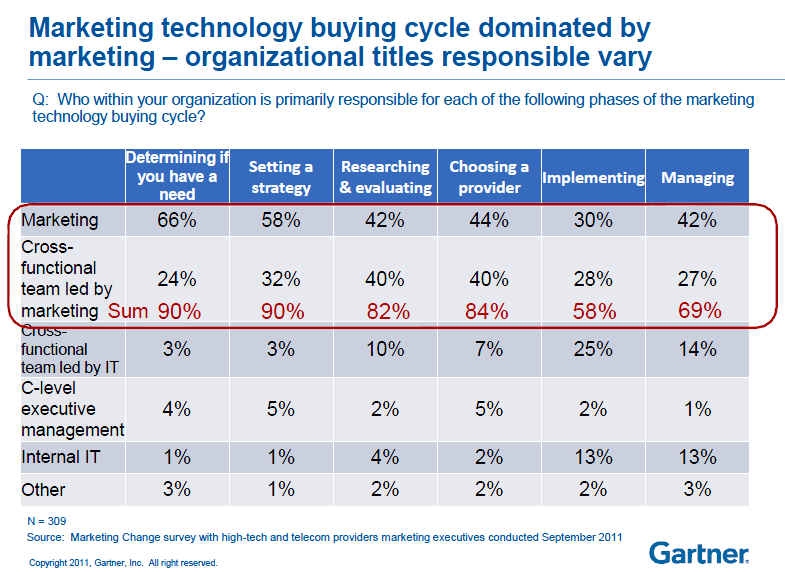But Is Marketing Ready To Buy Technology?
/ TweetThe following post was my January 15, 2012, contributionto the Marketing Executives Networking Group (MENG) Blend site. Something tells me that investment company CMOs will not be leading the charge to take over technology-buying but I hope you find the trend interesting to think about. The MENG Blend is a blogging initiative featuring bloggers from multiple marketing disciplines and industries. I blog on online marketing and social media.
When I was a corporate marketer on the inside years ago, I would occasionally run afoul of IT. My infractions? Oh, I took a few meetings with technology vendors that IT didn’t schedule. The vendors initiated the meetings…most of the time. And every once in a while maybe I’d bend the ear of a senior executive about technology that a competitor had and we didn’t. No, IT didn’t like that at all.
“Why do you have to agitate?” someone in IT asked me once. But, you know, that’s not how I saw it. My perspective was that Marketing had a right to pursue its agenda. To do our digital marketing job, we needed technology. What kind of corporate stewards would we be if we let disinterested or under-informed (on marketing technology topics) IT partners stand in the way of our effectiveness?
Given all that, a recent report from Gartner should be unequivocal good news. Gartner is tracking Marketing’s role in technology purchasing. And, Gartner Research Vice President Laura McLellan reported in a January 3 Webinar, by 2017 chief marketing officers will spend more on IT than CIOs.
Marketing Has More Buying Power
Citing triangulated data from Gartner studies and others’ data, McLellan said 2011 business-to-business and business-to-consumer marketing budgets as a percentage of revenue were almost three times as high as IT budgets (10% vs. 3.6%). IT budgets are forecast to grow 4.7% this year, and Marketing budgets to grow 9%.

As this Gartner table suggests, Marketing is prevailing in each of the phases of the marketing technology buying cycle. Marketing’s role is gradually assuming responsibility for “front room operations” while IT will run the back room, according to McLellan.
And yet, I am apprehensive. At more than one occasion during the Webinar—directed partly at technology suppliers—McLellan expressed a few reservations, too.
She called the data in the table “reasonably shocking to many of us who say, ‘Hmm, is Marketing ready? Is Marketing really ready for these decisions?”
Is This A Win?
The reflex is to cheer whenever Marketing gains power and budget but I need to think more about whether these findings suggest a Marketing triumph. Is Marketing getting in over its head, to the detriment of the enterprise and marketing management? If this is a win, what exactly did we win here?
Marketing’s perception of IT is that it “moves slowly,” “says no” and “prefers stability,” said McLellan. In her comments about marketers as buyers, she said, “The good news is that Marketing is inventive, marketing is creative. Marketing is willing to try point solutions even if they need to scrap them later if it will help them now.”
Guilty as charged. I’ve pushed for point solutions and know other “entrepreneurial” marketers who have done the same only to incur the wrath of IT. And guess what? Sometimes IT and their cost-benefit arguments (a discipline not everyone in Marketing has yet mastered) talked us out of it. They were right sometimes. Tension sometimes yielded the better, more considered outcome for the enterprise.
Unfortunately, McLellan is right when she tells her vendor audience, “Marketing is not technical, doesn’t want to be technical, doesn’t want to have to understand all the technology …This is definitely a ‘keep it simple, stupid’ scenario.” Ugh. C’mon, if we’re going to take this on, let’s at least take a stab at being informed about it. Let’s make the vendors work at explanations until we fully understand what we’re buying.
At one point. McLellan discussed growth in the hiring of marketing technologists (a subject commented on the MENGBlend previously) and it’s possible, maybe even likely, that someday Marketing will possess the required technical chops. But how many current-day CMOs do you know who are prepared to buy technology?
Scary Skirting Of Some Of The Issues
In answer to a question, McLellan said, “the CMOs we’re talking to are skirting some of the edges of governance security and regulatory compliance, and many unknowingly which is scary.” This is as concerns grow over technology privacy and customer data, location-aware and context-aware computing gain in usage and more data is bought and captured.
These added concerns are part of what’s driving Marketing to come to a decision to outsource, she said. Marketers prefer to hire others to watch out for what they don’t want to worry about.
OK, again, eek! Evaluating the outsourcing providers is pretty darn important and something else that is not naturally in today’s marketer’s wheelhouse. For help in making marketing technology and services decisions, Gartner data showed that marketers relied heaviest on recommendations from peers. I wouldn’t have any trouble if that was IT’s response (Gartner must have asked IT the question) but this from marketers concerns me.
Well, I’ve fretted enough. I encourage you to listen to the free on-demand Webinar in its entirety and download the presentation. Maybe you’ll tell me that I’m worrying too much.



